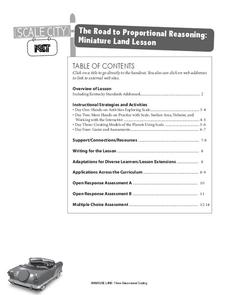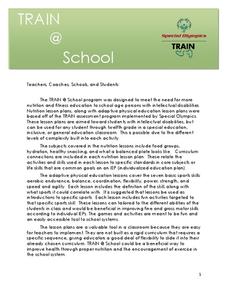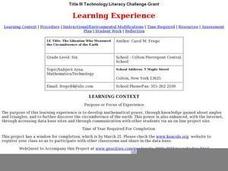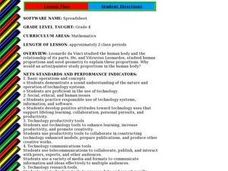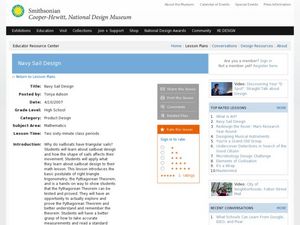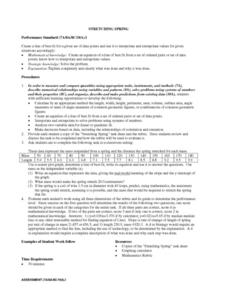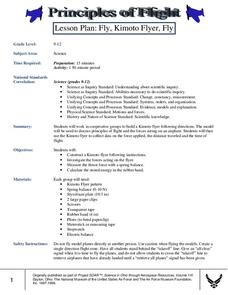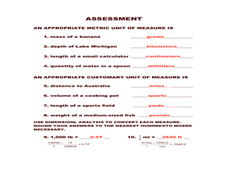Curated OER
Water in Earth's Hydrosphere
Environmentalists test stream water for temperature, pH, and turbidity. Each group shares their information and then the class makes an overall evaluation of the water quality. A slide show sets the backdrop for the teaching portion and...
Kentucky Educational Television
The Road to Proportional Reasoning
Just how big would it really be? Young mathematicians determine if different toys are proportional and if their scale is accurate. They solve problems relating scale along with volume and surface area using manipulatives. The...
Virginia Department of Education
Modeling the Big Bang Theory
Young astronomers learn about the Big Bang Theory and redshift through a hands-on activity in the last installment of a three-part series. Participants draw dots on balloons and then inflate them to model how galaxies moved farther apart...
Special Olympics
Train at School
Keep your mind and body fit with a fun activity about the five food groups. After going over the functions of fruit, vegetables, grains, meats and beans, and dairy, as well as oils and fats, learners participate in a bean bag toss...
Curated OER
Customary Measurement Conversions
Fifth graders discover in hands-on activities the relationships between the measures. They work in groups to create conversion tables using familiar measuring tools. Students solve problems requiring conversions.
Curated OER
Dream Bedroom Floor Plan
Students construct using Cabri software. In this geometry lesson, students convert between units and apply the correct measurements to build objects. They create the room virtually and manipulate the shapes to the desired measurements.
Curated OER
Inflation and Money
Young scholars define money in terms of its functions and refer back to discussion of markets and the role of money in reducing transaction costs. They give examples of types of money.
Curated OER
Using and Creating a Dichotomous Key
Young scholars assess what a dichotomous key is and how it identifies objects in a group through a process of answering yes/no-type questions about certain objects. They examine an interactive graphic key on sea turtles and then create...
Curated OER
Measurement of the Depth of the Ocean
Students comprehend the physical properties of pressure and Boyle's Law by designing a depth gauge. They construct a capillary depth gauge and calculate the calibrated depth marks of the capillary tube. They determine the margin of error...
Curated OER
The Librarian Who Measured the Circumference of the Earth
Sixth graders explore angles, triangles, and investigate the circumference of the earth. They participate in a Webquest, access data bases, and communicate with other students through an on-line project site involving the circumference...
Curated OER
Perimeter
Learners use their hands, feet, computer, and rulers to measure the perimeter of objects. For this measurement lesson plan, students measure objects around the room and computer generated shapes.
Curated OER
Arrange the Classroom (Part 1 of 3)
Fifth graders arrange the classroom using all the moveable objects and through the exploration of area and perimeter. They determine the area of the classroom, create and label model pieces of furniture using graph paper, and create a...
Curated OER
Body Proportion
Fourth graders measure the height and arm span of various classmates. They use a spreadsheet to design a graph that shows the class measurements from tallest to shortest in metric and standard systems.
Curated OER
Navy Sail Design
Students use the Pythagorean Theorem to explore sailboat design. In this Pythagorean Theorem lesson, two sides of a triangular sail are measured, and the theorem is used to calculate the third side. A worksheet, bulletin board design,...
Curated OER
STRETCHING SPRING
Students calculate the length, width, height, perimeter, area, volume, surface area, angle measures or sums of angle measures of common geometric figures. They create an equation of a line of best fit from a set of ordered pairs or...
Curated OER
Finding the Basal Area of a Forest Plot to Determine Stocking Levels
Students use graphs and plots to measure the basal area and stocking levels. In this graphing instructional activity students work in the field the use their data to help them complete a lab activity.
Curated OER
Magnitude of the Richter Scale
Students examine how a Richter scale operates. They create a booklet illustrating each rating on the scale. They discover how engineers use different measurement tools.
Curated OER
Principles of Flight
Students explore the principles of flight. In this flight lesson, students construct a model plane and investigate the forces acting on the flier. They will measure the thrust and calculate the stored energy.
Curated OER
Root, Root, Root for the Nutrients
Pupils observe the growth of a seed, predict what will happen when seeds are planted without soil, and conduct an experiment using a hydroponics system.
Curated OER
Insulators
Students design and carry out an investigation to test which materials is the best insulator: they predict which way heat energy flows in a system and analyze the flow of energy in a system from one point to another and from one form to...
Curated OER
Algebra/Geometry Institute: Area, Circumference, Perimeter
Students solve area problems. In this area, circumference, and perimeter lesson, students solve area and perimeter problems using standard and metric units of measure. They identify the best customary unit of measure for a...
Curated OER
Sea to Sky
Students investigate the Earth's major landforms and how they occur, and how engineers apply this knowledge for the design of transportation systems, mining, and measuring natural hazards. They listen to a teacher-led lecture, match...
Curated OER
Is It There?
Students participate in a instructional activity designed to illustrate these concepts using simple materials. They use Science process skills to observe, measure, predict, make inferences, and communicate while completing the activity....
Curated OER
Transforming Food Energy: A Balancing Act
Students explain their role as consumers. They use a purchased calorimeter or make their own simple calorimeter to measure the energy content in selected foods. This interesting lesson really gets students thinking about what they eat.

